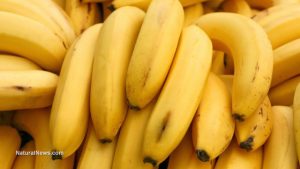
Advertisement
Bloating is a common complaint, and it can range in intensity from slightly annoying to incredibly painful. If you’re feeling bloated, try one of the eight superfoods listed below to relieve your condition.
You should also eliminate five common food triggers to see if they’re making you feel bloated.
What causes bloating?
It may take a bit of trial and error to figure out why you’re feeling bloated. Once you’ve identified the cause of your problem, eat more healing foods and stop eating trigger foods so you can start feeling better.
- You’re eating “irritable foods.” Some superfoods can cause bloating, but most of the time, you’re bloated because you’ve eaten too much junk food. Take a break from fried foods, too many carbs and processed snacks. To prevent bloating, consume more fresh fruits and veggies instead.
- You have dysbiosis or an imbalance of bacteria. If you have dysbiosis, there’s an imbalance between the “good” and “bad microorganisms in your gut.
- You have low stomach acid. Think about what you last ate the next time your stomach hurts and you feel bloated. If you’ve just eaten a meal that contains protein and you burp often, you may have low stomach acid. This occurs if you don’t have enough stomach acid to break down protein, which makes food sits undigested in your stomach longer. Common symptoms of low stomach acid include feeling bloated or stomach expansion after having a protein-rich meal.
Superfoods that will relieve bloating
Consume these eight healing fruits and vegetables to relieve painful bloating.
Asparagus
Eating the superfood asparagus can make your urine smell a little funny, but it also helps you flush all excess water and ease your bloating and discomfort. Asparagus also contains prebiotics that supports the growth of beneficial bacteria in your gut, which then promotes a healthy balance in your digestive system and helps prevent or reduce gas.
Additionally, asparagus contains soluble and insoluble fibers that you need for your overall digestive health.
Bananas
Bananas and other superfoods full of potassium such as avocados, kiwis, oranges and pistachios can help prevent water retention by regulating sodium levels in your body. This then helps prevent bloating caused by a diet high in salt.

Cucumber
Munching on juicy cucumbers may help because they contain quercetin, a flavonoid antioxidant that cam minimize swelling. Skip the sugary sodas and enjoy a refreshing glass of cucumber water to fight bloating.
Fennel seeds
Fennel isn’t just a spice, it’s a godsend for your digestive issues. Fennels seeds contain a compound that helps relax the gastrointestinal tract (GI tract), which then lets you pass gas and relieves bloating.
Not sure where to get fennel seeds? Buy bread with fennel and fennel seeds or look for sausages and other meat dishes.
Alternatively, you can chew on the seeds directly or drink a soothing cup of fennel tea after eating.

Ginger
Ginger contains zingibain, a digestive enzyme that helps your body break down protein. This compound also allows the food you eat to pass through your system more easily, which could help relieve your bloating or constipation.
Skip the ginger ale, which may contain little or no real ginger and high fructose corn syrup that can worsen bloating. Instead, sip on some ginger tea.
Papaya
Papaya contains papain, an enzyme that helps break down proteins in your GI system, which makes digestion easier. Papaya also has anti-inflammatory properties and dietary fibers that promote digestive health.
Peppermint and chamomile tea
A hot cup of peppermint or chamomile tea will help relax GI muscles, which then dissipates the gas that makes your stomach bloat.
Plain yogurt with probiotics
Yogurt with active cultures contains beneficial bacteria that promote gut health. Probiotics are good bacteria that help regulate digestion and keep your digestive tract healthy.
Choose plain yogurt with active cultures. For a naturally sweeter treat, add a bit of honey or granola.

Foods that trigger bloating
Some of the foods on this list are often considered good for you, but eating too much of them may cause bloating.
Apples
Apples are rich in fiber, and fructose and sorbitol, two sugars found in fruits that not everyone can tolerate. If you’re one of those unlucky few, snacking on apples can make you gassy and bloated. Yikes.
Aside from apples, fruits like pears, peaches and prunes may cause bloating.
Cruciferous vegetables
Broccoli, kale, cabbage and other cruciferous vegetables contain raffinose, a sugar that remains undigested until it’s fermented by the bacteria in your gut.
Undigested raffinose then produces gas that causes bloating.
However, this doesn’t mean you need to avoid cruciferous veggies altogether. You simply need to watch your portions to keep your digestive system healthy.
One trick is to steam kale, which won’t prevent bloating but make your leafy greens a bit easier to digest. Steaming vegetables helps soften the fiber and shrinks the portion while some of the water cooks out.
Dairy
Do you feel gassy after eating cheese or drinking milk? If dairy causes stomach discomfort, you may be lactose intolerant.
This means your body doesn’t have the necessary enzymes to break down lactose, the sugar in dairy products. Being lactose intolerant can also make gas form in your GI tract, which then causes bloating.
But not all is lost, especially if you love milk and cheese. If you’re lactose intolerant, avoid dairy products and look for lactose-free or nondairy alternatives instead.
Legumes
Already known for causing gas, consuming a lot of beans, lentils, soybeans and peas can cause gas and bloating.
Legumes contain protein, along with sugars and fibers that your body can’t absorb. If you eat legumes, when they reach your large intestine, gut bacteria consume them, which makes you bloat.
Since legumes are a part of a healthy diet, you can eat them and reduce bloating by combining beans with easily digestible whole grains such as rice or quinoa. Eating legumes with rice in smaller portions but more frequently will help your body get used to them.
Salty foods
A high-salt diet can cause water retention, which also results in bloating. According to the Centers for Disease Control and Prevention (CDC), a shocking 90 percent of Americans consume more sodium than is required for a healthy diet. This means the average adult consumes 2,300 mg of salt per day.
Meanwhile, adults over 50 and those with conditions like diabetes, high blood pressure and high risk of hypertension consume at least 1,500 mg of salt.
Salty junk food may be easier to avoid, but other foods may also contain sodium such as bread and soups.
If you’re unable to resist the siren call of a bag of chips, drink a lot of water to help flush it out. And next time, make sure you snack on a handful of nuts instead.

Bloating is a common complaint, but you can address it by avoiding trigger foods like salty junk food and eating more health-promoting superfoods.
Sources:
Advertisements







